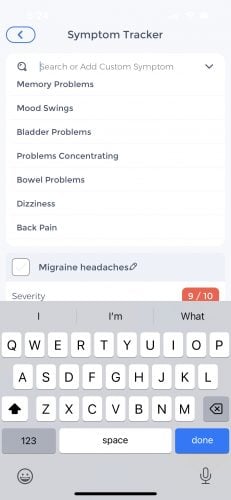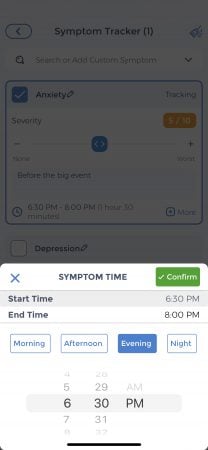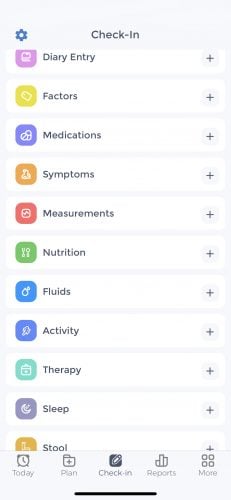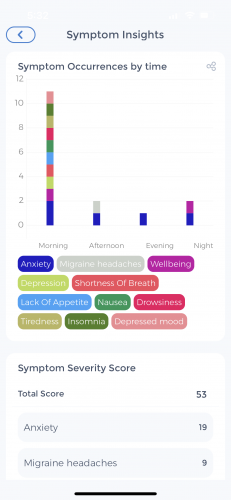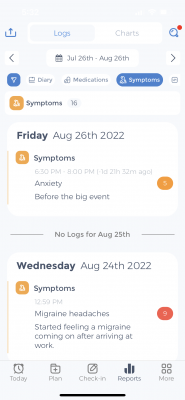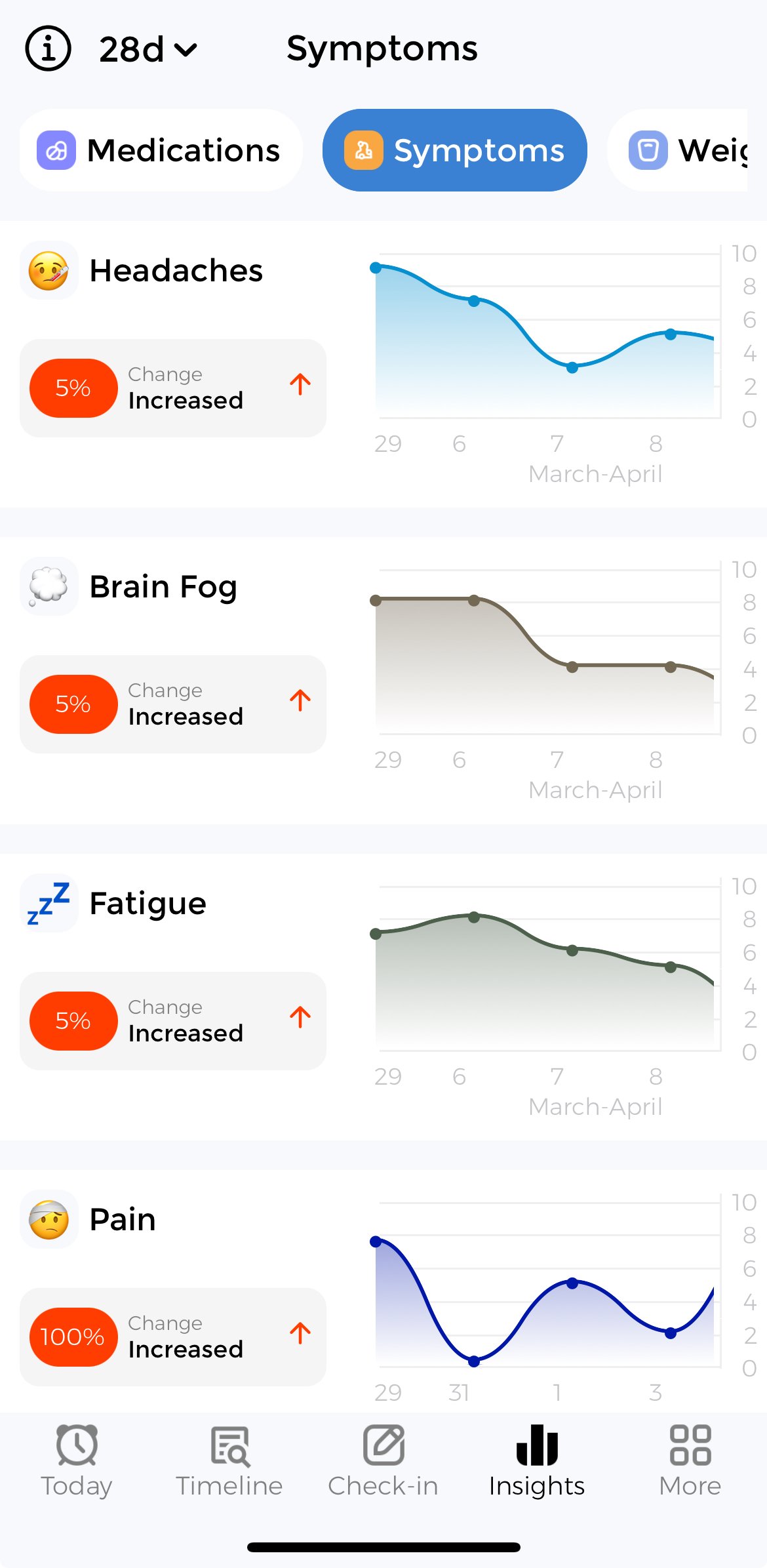Symptom Tracker
Track Symptoms Like Anxiety, Pain, Fatigue, and More
A symptom tracker app helps you log physical or mental health symptoms and spot hidden patterns over time. It supports better care decisions by connecting symptoms with triggers like food, stress, or medication, especially for chronic conditions.
Whether you’re managing flare-ups, tracking symptoms for a diagnosis, or trying to uncover triggers, CareClinic helps you take control faster. Log what matters daily and turn scattered symptoms into clear health insights you can actually act on.
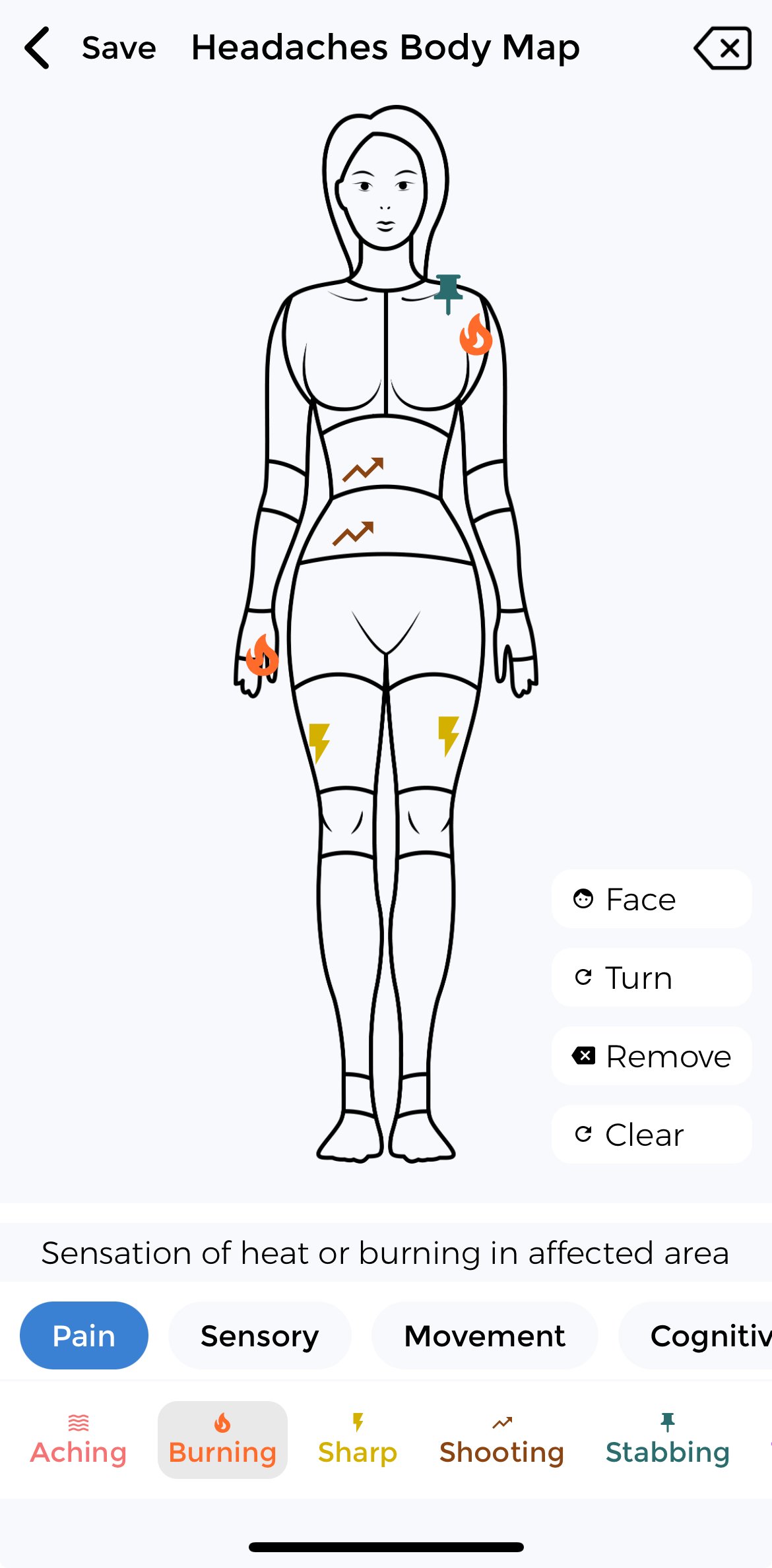
How to Use a Symptom Tracker App (Step-by-Step)
Success Stories
“After 3 weeks with CareClinic’s symptom tracker journal, I discovered gluten was causing 80% of my chronic pain flare-ups. My pain levels dropped from 8/10 to 3/10.”
“My A1C dropped from 9.2 to 6.8 in 4 months. I avoided insulin completely and lost 35 pounds by tracking everything.”
“Haven’t had a panic attack in 6 months after discovering my anxiety triggers through tracking mental health symptoms, sleep, and caffeine with CareClinic.”
Manage Medical Symptoms and Your Symptom Log
Symptom Management Features
Personalized Symptoms Tracker
Add a start date to your symptoms and use it for reference as part of your personal health record. This helps identify exactly when flare-ups began and how long each symptom episode lasted. Track mental health, behavioral, and physical health symptoms anytime with our mobile app.
Most Common Tracked Symptoms:
Use advanced functionality to connect symptoms with specific care plans or chronic conditions like ME/CFS, IBS, IBD, migraines, MS, Lyme, cancer, depression, and PMDD to remain better organized. Use the mobile app as your digital symptom tracker journal. This will help you manage multiple treatments for multiple health conditions without needing to delete medications or symptoms from a past treatment.
Install our free medical symptom tracker journal app for Android or iOS:
Symptom tracker reports, charts & correlation insights
Transform your symptom data into actionable insights with powerful analytics, AI-powered pattern recognition, and professional reports that help you and your doctor make better health decisions.
Reports & Analytics
Symptom Tracker App Comparison: CareClinic vs Other Apps
Track Symptoms by Condition
The CareClinic symptom tracker app supports hundreds of symptoms and chronic conditions. Whether you have a chronic illness, acute condition, or want to monitor general wellness, our app adapts to your unique health journey. Track predefined symptoms or create custom ones that matter to you. Our comprehensive database covers everything from common symptoms to rare conditions.
Prefer tracking symptoms offline? Use our free printable symptom log templates.
Download our free symptom tracker PDF template that can be printed for offline tracking. For those who want to track their symptoms offline or prefer a bullet journal, these will also be provided in Excel spreadsheet format.
FAQs About Symptom Tracking
Is CareClinic really free or are there hidden charges?
Yes, CareClinic is completely free to start tracking your symptoms. You get powerful symptom logging, reports, charts, and data export at no cost. For people who want the most advanced health tracking with premium analytics, unlimited care team sharing, and insights that help you spot patterns faster, we offer an upgrade option. Most users who are serious about their health outcomes choose to upgrade because the advanced features are genuinely life-changing. No credit card required to start.
Is CareClinic easy for beginners, seniors, or non-tech-savvy users?
Yes! If you can use a smartphone, you can master CareClinic. The app is designed for all ages and skill levels with large buttons, clear labels, and simple navigation. You will be tracking your first symptom in under 60 seconds. Plus, we have video tutorials, help guides, and customer support if you ever get stuck.
Does CareClinic work for chronic illnesses such as fibromyalgia, IBS, or migraines?
Absolutely. CareClinic is built to track any symptom for any condition. Chronic pain, fibromyalgia, diabetes, depression, anxiety, IBS, migraines, arthritis, lupus, MS, cancer treatments, ADHD, PMDD, ME/CFS, IBD, or any other health condition. You can track mental health, behavioral, and physical health symptoms or create custom ones. Track medications, treatments, mood, sleep, pain levels, energy, triggers, and flare-ups in your symptom tracker journal. If you can feel it or measure it, you can track it in CareClinic’s mobile app.
How is CareClinic better than paper journals or other symptom tracking apps?
Paper gets lost, damaged, and is impossible to analyze for patterns. Other apps are either too complicated or too basic. CareClinic gives you the perfect balance: simple enough for daily use, powerful enough to spot patterns your doctor will love. It automatically generates charts, finds correlations between symptoms and triggers, sends reminders, backs up to the cloud, and lets you export professional reports instantly. You will never go back to paper or other apps.
Is my health data safe and private when using CareClinic?
100% yes. Your health data is encrypted with bank-level security and stored on HIPAA-compliant servers. Only you can access your data unless you choose to share it. We never sell, rent, or share your personal health information with anyone. Ever. Your privacy is not for sale. You own your data completely and can export or delete it anytime.
Can I share CareClinic reports with my doctor, caregiver, or whole care team?
Yes! This is one of CareClinic’s most powerful features. With one tap, you can generate professional PDF reports showing your symptom patterns, medication adherence, and health trends over any time period. You can email these reports directly to your doctor, print them for appointments, or share them with family caregivers. Many doctors love these reports because they provide clear, objective data instead of trying to remember symptoms from weeks ago.
How do I quickly start using CareClinic to track symptoms?
Download the CareClinic app from the App Store or Google Play, create your free account in 30 seconds (no credit card needed), and start logging your first symptom immediately. The app walks you through everything with helpful tips and tutorials. Most people are tracking symptoms within 2 minutes of downloading. You can also import data from other apps or start fresh.
Can CareClinic track and manage multiple health conditions and medications?
Perfect! CareClinic excels at managing complex health situations. You can create separate care plans for different conditions, track unlimited medications with dosing schedules and refill reminders, monitor multiple symptoms simultaneously, and see how everything interconnects. The app helps you organize everything in one place instead of juggling multiple apps, spreadsheets, or paper logs. Many users manage 5+ conditions and 10+ medications effortlessly.
What happens if I forget to log symptoms in CareClinic?
No problem! CareClinic sends gentle, customizable reminders at times that work for you. You can set multiple daily reminders, weekly check-ins, or medication alerts. Even if you miss days or weeks, you can backfill entries anytime. The app also lets you track symptoms reactively when flare-ups happen, not just proactively. Consistency helps, but perfection is not required for valuable insights.
Can CareClinic track symptoms for family members or pets?
Absolutely! Many caregivers use CareClinic to track symptoms for children, elderly parents, spouses with chronic conditions, or even pets with health issues. You can create separate profiles for each family member, set up medication reminders for them, and generate reports for their doctor visits. It is especially helpful for tracking kids with ADHD, elderly parents with dementia, or pets with chronic conditions.
Do I have to track symptoms daily in CareClinic?
That is totally fine! CareClinic adapts to your lifestyle and health needs. You can track daily during flare-ups, weekly for maintenance, or only when symptoms change significantly. The app provides value whether you log once a day or once a month. Many users track intensively during bad periods and casually during good periods. The insights are still valuable with any tracking frequency.
Can I export or download my data and reports from CareClinic?
Yes! You can instantly export your data in multiple formats: PDF reports for doctors, CSV files for spreadsheets, or raw data for other apps. Print professional charts and graphs for appointments, email reports to your healthcare team, or backup your data to cloud storage. You own your data completely and can take it anywhere. No vendor lock-in ever.
How do I track and log symptoms step by step in CareClinic?
Super simple! Open CareClinic, tap the “+\” button, select “Symptom” from the menu, choose from hundreds of pre-loaded symptoms or create a custom one, rate the severity on a 1-10 scale, add the duration, location, triggers, and any notes, then save. The whole process takes 30 seconds. You can also add photos, voice memos, or connect symptoms to medications, meals, activities, or mood for deeper insights.
What symptoms can I track using CareClinic?
You can track any symptom imaginable! Pre-loaded options include chronic pain (headaches, low back pain, joint pain), digestive issues (nausea, bloating, diarrhea), mental health symptoms (anxiety, depression, mood swings), neurological symptoms (brain fog, dizziness, fatigue), sleep problems, skin conditions, respiratory issues, and hundreds more. Plus you can create unlimited custom symptoms for anything not listed. The mobile app adapts to your unique health situation and tracks flare-ups automatically.
Who should use a symptom tracker app?
Anyone dealing with health challenges! This includes people with chronic conditions (fibromyalgia, diabetes, arthritis, IBS, migraines, ME/CFS, IBD, PMDD), mental health conditions (depression, anxiety, ADHD), autoimmune diseases (lupus, MS, Crohn’s), cancer patients tracking treatment side effects, parents monitoring children’s symptoms, caregivers helping elderly family members, and even pet owners tracking animal health. If you want better health outcomes and clearer communication with doctors, our symptom tracker journal is for you.
What if I need help or get stuck using the app?
We have you covered! CareClinic includes built-in tutorials, helpful tips throughout the app, a comprehensive help center with articles and videos, email support from real humans (not bots), and an active community forum. Most questions are answered within hours. The app is designed to be intuitive, but if you ever get confused, help is always available. We want you to succeed with your health tracking.
What is the difference between active and passive symptom tracking?
Active tracking means logging symptoms regularly on a schedule, even when you feel good, to establish baselines and catch subtle changes early. Passive tracking means only logging symptoms when they occur or worsen. CareClinic supports both approaches. Active tracking provides more comprehensive data for pattern recognition, while passive tracking requires less daily commitment but may miss subtle trends. Most users start passive and gradually become more active as they see the benefits.
How is a symptom tracker different from online symptom checkers?
Huge difference! Online symptom checkers give you generic, often scary possibilities based on single symptoms. CareClinic tracks YOUR specific symptoms over time to reveal YOUR unique patterns, triggers, and treatment responses. Instead of “you might have 47 different diseases,” you get “your headaches correlate with poor sleep and improve with magnesium.” Symptom checkers guess. Symptom trackers provide personalized insights based on your actual data.
Does CareClinic offer medical advice or diagnosis?
No, and that is actually a good thing! CareClinic is a tracking and data tool, not a diagnostic tool. It helps you collect organized, objective information about your health to share with qualified medical professionals who can provide proper diagnoses and treatment advice. Think of it as your personal health data assistant that makes doctor visits more productive by providing clear, detailed information instead of vague recollections.
Trusted by Leading Health Organizations
CareClinic is recognized and recommended by healthcare professionals, medical institutions, and health organizations worldwide for its comprehensive symptom tracking capabilities and clinical-grade security. Download it today on the Google Play Store or Apple App Store for free.

Stop guessing. Start tracking. Get answers.
Join 500,000+ people who stopped suffering in silence and started getting real answers about their health.
✓ Free to start • ✓ No credit card required • ✓ HIPAA compliant



